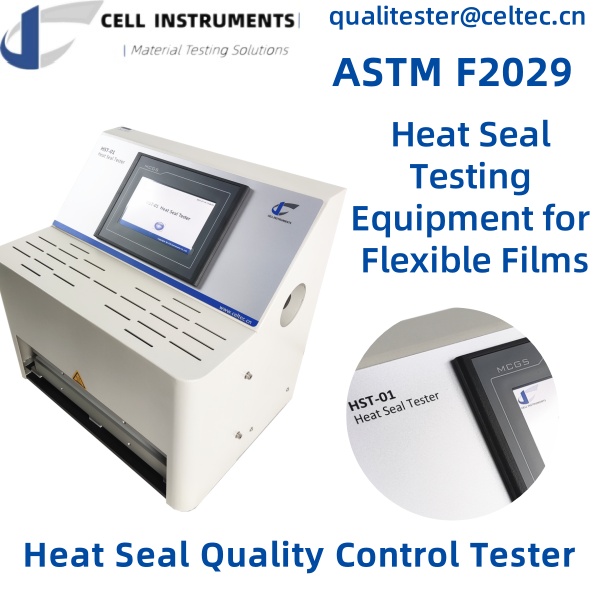Introduction
Heat seal quality control is critical for industries that rely on the integrity of sealed packages, including packaging, pharmaceuticals, medical devices, and food products. Ensuring that heat seals are strong, uniform, and defect-free is essential for product safety and quality. This article delves into the key aspects of heat seal quality control, focusing on the importance of compliance with ASTM F2029, and highlights the role of advanced testing equipment in achieving precise and reliable results.
Understanding Heat Seal Quality Control
Heat seal quality control involves the evaluation of heat seals to ensure they meet the required strength and uniformity standards. The heat sealing process involves applying heat and pressure to two materials to create a bond, typically used in flexible packaging. The effectiveness of this bond directly impacts the integrity of the package and the safety of its contents.
Importance of ASTM F2029 in Heat Seal Testing
ASTM F2029 is the standard test method for making heat seals to determine the heatsealability of flexible webs as measured by seal strength. This standard outlines the procedures for making and evaluating heat seals, ensuring consistency and reliability in testing. Compliance with ASTM F2029 is crucial for industries where heat seal integrity is paramount, as it provides a standardized approach to testing that is recognized globally.
Key Steps in Heat Seal Testing
- Preparation of Test Specimens:
- Samples are cut to specified dimensions, ensuring uniformity.
- Samples must be free from defects and contaminants that could affect seal quality.
- Setting Test Parameters:
- Appropriate temperature, pressure, and dwell time settings are selected based on the material.
- Documenting the selected parameters ensures consistency and reproducibility.
- Conducting the Test:
- The sample is placed between the heated sealing bars, and the pre-set pressure is applied for the designated dwell time.
- After cooling, the sample is analyzed for seal strength and uniformity.
- Measuring Seal Strength:
- The sealed sample is pulled apart using a tensile testing machine.
- The force required to break the seal is measured and recorded, providing a quantitative measure of seal strength.
Applications of Heat Seal Testing Equipment
- Packaging Industry: Ensuring the integrity and quality of heat seals in flexible packaging materials, crucial for maintaining product freshness and safety.
- Medical Devices: Verifying the reliability of heat seals in sterile packaging, essential for preventing contamination and ensuring patient safety.
- Pharmaceuticals: Testing the seal strength of blister packs and other pharmaceutical packaging to ensure product integrity and compliance with regulatory standards.
- Textiles: Testing heat-sealable fabrics used in technical textiles and garments, important for product durability and performance.
- Food and Beverages: Ensuring the safety and quality of sealed food and beverage packaging, vital for consumer protection and product shelf life.
The Role of Advanced Testing Equipment
Cell Instruments’ Best Laboratory Heat Seal Tester is designed to meet the stringent demands of industries requiring precise heat seal evaluation. This advanced testing device is fully compliant with ASTM F2029, ensuring that your materials meet industry standards. The tester is versatile, accommodating a broad range of materials, including plastics, textiles, paper, and adhesives. For those requiring specific testing protocols, the device can be customized to meet unique needs, offering an unparalleled level of adaptability.
FAQs
- What is the significance of ASTM F2029 in heat seal testing?
- ASTM F2029 provides a standardized method for evaluating heat seals, ensuring that testing is consistent and reliable across different materials and applications.
- How does heat seal quality control impact product safety?
- Proper heat seal quality control ensures that seals are strong and uniform, preventing leaks, contamination, and ensuring the overall integrity of the packaging.
- What types of materials can be tested with the Heat Seal Tester?
- The Heat Seal Tester is suitable for a wide range of materials, including plastics, textiles, paper, and adhesives, making it versatile for various industries.
- Can the Heat Seal Tester be customized for specific testing needs?
- Yes, Cell Instruments offers customization options to tailor the Heat Seal Tester to specific testing protocols or material specifications.
- Why is automation important in heat seal testing?
- Automation reduces human error and increases throughput, making the testing process more efficient and reliable.
Related Products
Related Article
Heat Seal Strength Test Method
Polyethylene Heat Seal Temperature
Seal Strength of Plastic Films
Heat Seal Equipment for Laboratory Testing
Laboratory Heat Sealer for Film Testing
Plastic Film Heat Seal Testing


